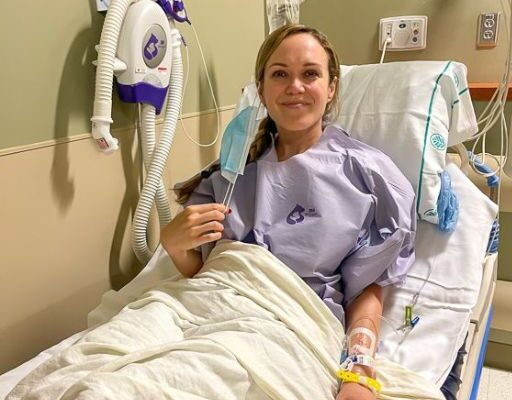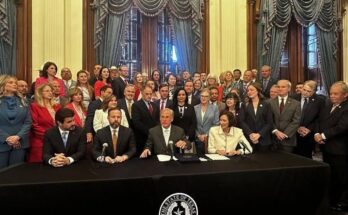People think the hardest part is the physical pain.
It’s not.

It’s the silence. The emptiness that comes after the nurses stop talking softly and the hallway goes quiet and your husband isn’t allowed past those double doors anymore.
This was my fifth.
Fifth time walking into a hospital with a flutter of hope still clinging to my chest. Fifth time hearing the same words in different voices—“We’re so sorry. There’s no heartbeat.”
That moment is like being told the world has suddenly collapsed under your feet. You don’t fall to the ground, not at first. You just freeze. You hear the words, but your brain refuses to believe them. Your body knows what’s happening, but your heart? It’s still trying to catch up, still clinging to a sliver of hope, even though you know, deep down, it’s not coming.
I wanted to scream. I wanted to curl up and shut myself off from everything, but instead, I nodded, said “Thank you,” and walked out of the room like I was made of stone. It was the hardest thing to do. To walk out, knowing that my baby, the one I had carried for months, would never be in my arms. I would never get to see those tiny fingers, never hear the soft breaths, never get to whisper to them about the world waiting for them.
And yet, there I was, forcing myself to smile minutes later, standing with my husband, smiling for a photo that would forever serve as a reminder of the moment I lost everything.
The photo was taken by a nurse who had been so kind, her smile gentle as she handed us a tiny framed picture—just a blurry image of a little body wrapped in a hospital blanket, the only thing we would ever have to remember them by. She said it was a keepsake, something to hold on to, something to keep in the memory box I was already preparing in my head. But how could I hold onto something that was never mine to keep?
Later, when we left the hospital, the drive home was a blur. My husband, Daniel, kept his hand on mine, but the warmth of his touch felt distant. It wasn’t the kind of comfort I needed, the kind I used to feel when we faced tough times together. It felt like a blanket, too thin to keep me warm, too distant to keep me safe. The emptiness I felt inside was suffocating.
When we finally got home, I went straight to our bedroom, closed the door, and sat on the bed, the stillness overwhelming me. Daniel knocked softly, his voice muffled behind the door. “Can I come in?”
I didn’t answer. How could I? I had no words. I didn’t even know what I was feeling, let alone how to explain it to him. I wanted to tell him how devastated I was, how deeply I mourned, but it felt like I was failing him too. He had been excited, hopeful, just like me. And now, we both had to live with the same heartbreak. The difference was, I had carried this baby. I had felt every flutter, every heartbeat that had now turned into silence.
Eventually, Daniel opened the door and sat beside me, wrapping his arm around me. He didn’t try to say anything, didn’t offer any comforting words. He just held me, as we both cried. It felt like the only thing we could do.
Days passed, and the world outside seemed to keep moving. Friends reached out, offering condolences, but nothing anyone said could fill the hole in my chest. The doctors told us it could happen to anyone, that there was no reason, no clear cause. It wasn’t my fault, they said. But none of that mattered. I was left with the question no one could answer: why me? Why us?
In the weeks that followed, I kept going through the motions. I went to work, tried to pretend I was okay, tried to act like everything was normal. But deep down, I was so far from okay. I couldn’t bring myself to be around babies. The thought of seeing someone else’s child only reminded me of the one I had lost. Every little baby laugh, every soft coo, felt like a dagger to my heart. It was all too much.
But one evening, after a particularly long day at work, Daniel came home with an envelope in his hand. He didn’t say much when he handed it to me, but I could see the uncertainty in his eyes.
“What’s this?” I asked, already feeling the weight of dread.
“It’s from the hospital,” he said quietly.
I hesitated for a moment before tearing it open. Inside was a letter, and in the letter, an apology. But there was more than that. It was an offer for a memorial. A chance to create something lasting for our baby—something we could remember them by, something that would honor their life, even if it was a short one.
At first, I couldn’t bring myself to even think about it. I didn’t want to memorialize a life that never had a chance to bloom. But Daniel was insistent, and, after a lot of back and forth, I agreed. It felt wrong, but it also felt like something I needed to do, to try to heal.
The memorial process wasn’t easy. There were decisions to be made—where the memorial would be placed, what it would look like, what message we wanted it to carry. It wasn’t just about putting a name on a stone. It was about giving our child something that would outlive both of us, something that said, “You mattered.”
As we worked through the details, something shifted in me. I realized that this wasn’t just about us. It wasn’t about the pain or the loss or the emptiness. It was about honoring a life, however brief, and finding a way to keep that love alive, even in the face of heartbreak.
We chose a small spot near the garden in the park where we used to walk on weekends, the place where we had talked about what our future would look like with a child. The place that, in my mind, had always been filled with possibilities. We planted a tree in that spot, a symbol of life continuing, a symbol of our baby’s spirit.
The memorial was simple—a small plaque with their name, date, and the words, “Forever loved, never forgotten.” It was all I could do.
And when it was finished, when everything was in place, I felt a strange sense of peace. It wasn’t a magic fix. It didn’t make everything better. But it was a way of honoring them, of acknowledging their place in our world. And that gave me a sense of closure I hadn’t realized I needed.
The most surprising twist, though, came a few months later. I received a letter in the mail, not from the hospital this time, but from the same nurse who had taken the photo of us. She had written to tell me that our memorial tree had inspired other parents who had suffered similar losses. It had started a small project at the hospital, helping families honor their babies in a similar way.
That letter hit me harder than I expected. I hadn’t realized how much of a ripple effect our decision had made. In the pain of our own loss, we had unknowingly helped others heal too.
Sometimes, life is about finding purpose in the darkest moments. And while I would give anything to have my baby back, I now see that there is something beautiful in the way we’ve been able to honor their memory and help others along the way.
So, if you’re ever in a place of deep pain, remember that your actions, no matter how small, can create ripples that reach further than you’ll ever know. Your pain, your healing, can be a source of strength for others.
Share this if it resonates with you or someone you know. And remember, you’re not alone. Healing comes in many forms, and sometimes, it’s through helping others that we begin to heal ourselves.



